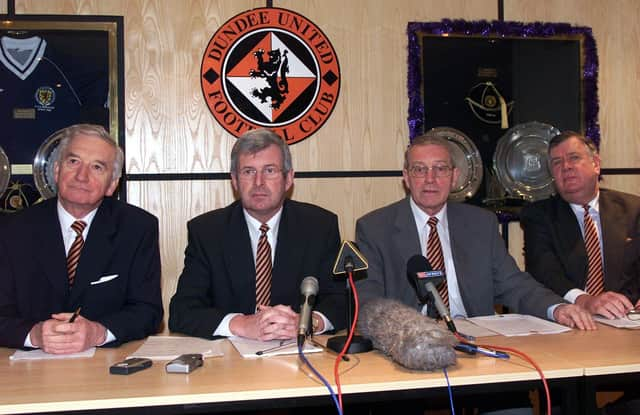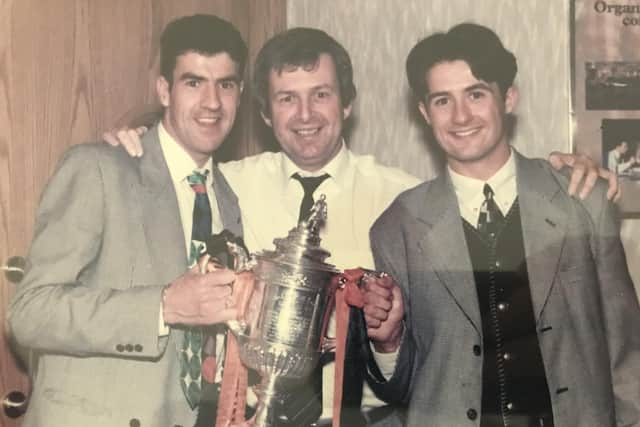Remembering Bill Littlejohn – Mr Dundee United


In the turbulent hours directly after Jim McLean had swung a punch at a reporter, a calm, authoritative figure was required to step into the breach. Dundee United were fortunate they had just the person.
Little over a year earlier, Bill Littlejohn, then aged 55, had taken early retirement as Edinburgh branch manager at General Accident, the company he joined straight from Harris Academy in Dundee. He was therefore free to lead a club during what the United centenary history book described as “the most traumatic season in modern times”.
Advertisement
Hide AdAdvertisement
Hide AdHis availability was one of the first things to go right for United in a torrid 2000/01 campaign. Two draws from the first 16 league games was the club’s worst ever start, with Paul Sturrock having resigned after the second of them to be replaced by Alex Smith.


McLean’s remarkable legacy was threatened by the outburst during an interview with BBC reporter John Barnes and after a 4-0 home defeat to Hearts. He was impelled to stand down as chairman and managing director after a Tannadice career that began as a young manager in late 1971. “When Jim was forced by us to resign, we felt, well, we’ve done that, now what do we do?” recalls Bruce Robertson, who was on the board at the time.
Littlejohn, who died last month, provided the much-needed firm hand on the tiller. Today would have been his 76th birthday. A three-paragraph statement on the Dundee United website relaying news of Littlejohn’s death, just weeks after he was diagnosed with blood cancer, did not seem to adequately reflect the extent of his contribution, nor that of his family.
Indeed, between 1939, when his father, Jimmy, signed from St Johnstone, and early 2002, when Bill left as a director, there were only a handful of years when there was not a Littlejohn involved at Dundee United.
Littlejohn senior skippered the side in the 1-0 loss to Rangers in the Scottish War Emergency Cup final in 1940. He signed Jock Stein on loan during a short spell as manager before serving as a director for nearly half a century until his death in 1989, with his son joining the board three years later.
If all this was not enough, Littlejohn snr is credited with conceiving Taypools, a lottery scheme that provided much needed funds. It’s no exaggeration to say this income laid the foundations for the club’s great years under Jerry Kerr and then, of course, McLean, whose inspirational management took United to another level in terms of trophies.
His tenure as chairman was not quite so distinguished. Littlejohn junior stepped into the power vacuum created by McLean’s rush of blood to the head following the heavy defeat by Hearts on 14 October, 2000. Shortly afterwards it was confirmed he would be carrying out “day-to-day executive duties” at Tannadice.
This was supposed to be a temporary arrangement. However, Littlejohn continued in the role for more than a year, commuting to Dundee from his Edinburgh home on a daily basis to help navigate the club through the doldrums.
Advertisement
Hide AdAdvertisement
Hide Ad“It was the great thing having Bill there,” recalls Robertson, 81. “It was the biggest contribution he made to the club – and it was an enormous one.
“He was commercially alert, he had worked for a big organisation in the past. He knew how to run things in a commercial sense. He was approached by the board. He did not hesitate. He said he would step in on a short-term basis. But it went on and on and on.”
It was envisaged McLean would dispose of his shareholding during this period. In actual fact, he used the time to form a consortium allowing him to wrest back power. “You’re surprised? What do you think we are?!” exclaimed Littlejohn at a press conference after McLean’s intentions became apparent following the striking of an entente cordiale with Gibby Haggart, the Dundee-supporting son-in-law of former chairman George Fox.
Perhaps understandably, McLean had found it hard to let go. Not long after the Barnes incident he walked back into Littlejohn’s office. “Jim, what are you doing here?” he wondered, not unreasonably. After all, they had supposedly agreed the terms of his departure just days earlier.
The subsequent bitter coup pitted Dundee United legend against Dundee United legend – McLean versus Doug Smith, the stalwart former defender, director and chairman. Smith played more than 600 times for the club after replacing Ron Yeats at centre-half.
Littlejohn, Robertson and Smith were unceremoniously turfed out of a stadium which was a home from home for them. Robertson’s father Ernest was involved with the club as far back as Dundee Hibs days and while chairman at United once pledged the family’s own company, Robertson Fruit Products, as security during a particularly dire financial crisis. One of Robertson’s earliest memories is clambering up the stairs to the old wooden directors’ box – perilously placed on stilts – that they had at Tannadice at the time. Sentiment had to go out the window in the heat of a corporate battle. The ousted board including Don Ridgway, ostensibly one of McLean’s men, held an impromptu press conference in The Athletic bar, Smith’s pub round the corner from Tannadice. They had all turned up – unexpectedly – for the EGM at the stadium, where their fate was sealed.
Having covered these events for The Scotsman, the next time I was knowingly in a room with Littlejohn was because he wanted to pull me up on something I had written about the circumstances of Duncan Ferguson’s departure from the club. We met thereafter for coffee at regular intervals in Edinburgh to discuss what some might argue is the only subject worth talking about: the football scene in Dundee.
An authority on United, he was also on the board of the Scottish Football Partnership until stepping down last year and he could also lay claim to a past life as a mean cricketer; his nine wickets for ten runs for Kinloch against HMS Condor remain the second-best bowling figures in the club’s history.
Advertisement
Hide AdAdvertisement
Hide AdOne of the great sorrows is that he still had so much left to say. Tales, many of them involving McLean, who he accompanied on many trips aboard to scout players and teams and even a manager, McLean’s own Scottish Cup-winning replacement Ivan Golac, will amuse the celestial audience someone as genial as Littlejohn will undoubtedly command. Their gain is our loss, something particularly painfully borne by Moira, his wife of 52 years, and sons Stewart and Andrew – both, of course, United diehards.
He didn’t allow the sour way things had ended courtesy of McLean and co to affect his feelings for the club. “I have some very happy memories of supporting Jim McLean as manager,” Littlejohn said in that hastily-convened press conference in a bar on the brow of the Hilltown 18 years ago.
“I am sad it has come to this. We are still supporters. We will continue to support the club for the rest of our lives.”
It wasn’t in his make-up to break a promise. And he didn’t. As the celebrant at his funeral on 18 May concluded: United together, United apart.
A message from the Editor:
Thank you for reading this story on our website. While I have your attention, I also have an important request to make of you.
With the coronavirus lockdown having a major impact on many of our advertisers - and consequently the revenue we receive - we are more reliant than ever on you taking out a digital subscription.
Subscribe to scotsman.com and enjoy unlimited access to Scottish news and information online and on our app. With a digital subscription, you can read more than 5 articles, see fewer ads, enjoy faster load times, and get access to exclusive newsletters and content. Visit https://www.scotsman.com/subscriptions now to sign up.
Our journalism costs money and we rely on advertising, print and digital revenues to help to support them. By supporting us, we are able to support you in providing trusted, fact-checked content for this website.
Joy Yates
Editorial Director
Comments
Want to join the conversation? Please or to comment on this article.